Different Types of Sweeteners
Your comprehensive guide to the various names of the different types of sweeteners and the healthiest sweeteners.
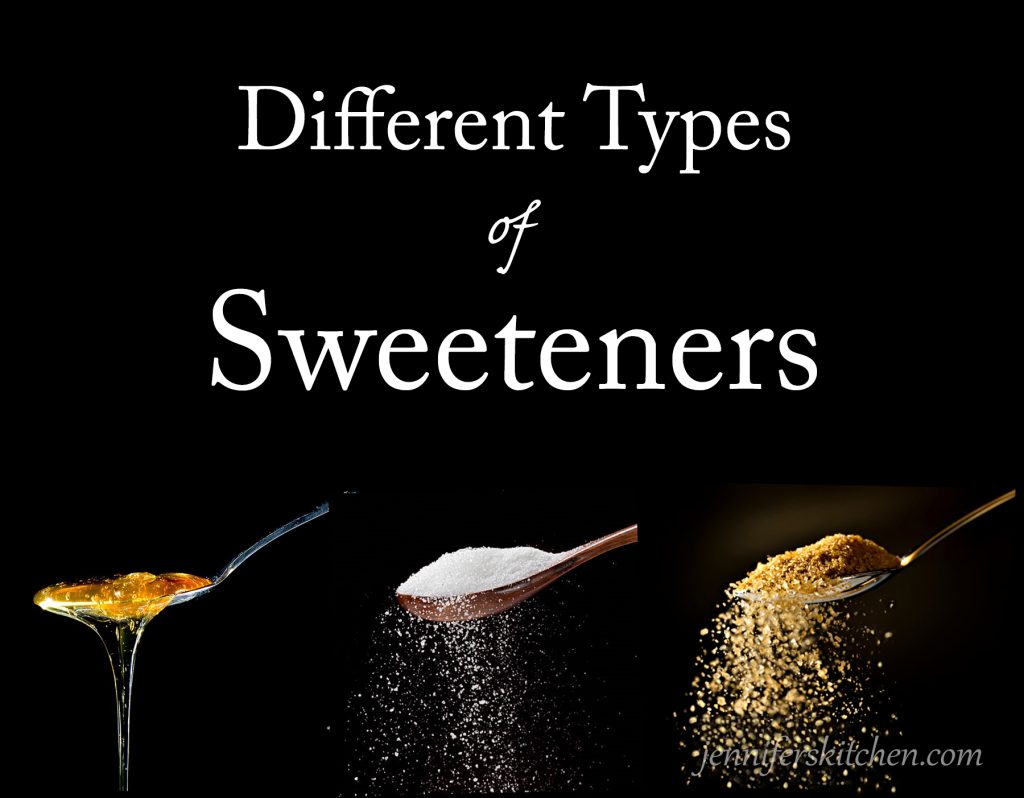
Most people eat far too much sugar.
One of the keys to reducing or eliminating sugar and other sweeteners in your diet is knowing the various names of sugar. Some of these sweeteners are healthy options. Some are not. Here’s your guide to the different types of sweeteners and the healthiest sweeteners.
Sugars and Other Types of Sweeteners
About 100 years ago, the list of different types of sweeteners that people consumed came to about six. Today, the list is miles long.
Here is your guide to some of the more commonly used sweeteners along with their health risks (if any) and whether I recommend them or not. I have divided these sweeteners into 3 categories:
1. artificial sweeteners
2. alcohol sugars
3. natural sweeteners
In addition, at the end of this post, you will find a list of the healthy sweeteners that I recommend.
Artificial Sweeteners
Artificial sweeteners is one class of the many different types of sweeteners. Also called non-nutritive sweeteners, artificial sweeteners are typically created through a chemical process.
Acesulfame potassium (acesulfame-K)
(Also called Ace-K or Sunett)
Acesulfame potassium is a white crystalline powder that is about 200 times sweeter than regular table sugar. This sweetener is commonly found blended with other sweeteners in sugar-free products.
Health Risks
Acesulfame potassium is a potassium salt containing methylene chloride, a known carcinogen. Long term exposure to methylene chloride can cause headaches, nausea, emotional imbalances, hormone disruption, and damage to the liver and kidneys. Acesulfame has been shown to produce changes in brain function, breast tumors, lung tumors, and other types of tumors, leukemia, and chronic respiratory disease in rodents.
Recommended?
NO
Aspartame
(Also called Nutrisweet, Equal, Sweet One, and Spoonful)
Aspartame is an artificial sweetener comprised of approximately 50% phenylalanine, 40% aspartic acid, and 10% methanol. Aspartame is 200 times sweeter than sugar.
Health Risks
Reported side effects from the use of aspartame include abdominal pain, anxiety, arthritis, depression, headaches, fibromyalgia, memory loss, nausea, heart palpitations, irritable bowel syndrome, seizures, neurological disorders, vision problems, and weight gain. It has also been shown to damage bacteria in the gut.
Recommended?
NO
Sucralose
(Also called Splenda)
Sucralose is an intensely sweet, artificial sweetener made by a complex chemical process.
Health Risks
Studies show that consuming food cooked or baked with sucralose can contribute to cancer. In addition, this sweetener can cause inflammation and a reduction in good gut bacteria.
Alcohol Sugars
Mannitol, sorbitol, xylitol, lactitol, isomalt, maltitol, and hydrogenated starch hydrolysates are types of sweeteners called alcohol sugars.
Alcohol sugars can cause digestive issues and contribute to poor gut health. They are also known to contribute to weight gain.
Natural Sweeteners

The term natural sweeteners refers to sweeteners that are derived from plants. This group of sweeteners contains many different types of sweeteners, made from many different plant sources.
Keep in mind that just because a sweetener is a natural sweetener, does not mean that it is healthful.
Agave
Agave is a sweetener commercially produced from several species of the agave plant. The agave plant may have some health benefits, but it must go through extensive refining and processing to produce agave syrup. This processing is similar to the process of making high fructose corn syrup and destroys nearly all of the plant’s beneficial health effects.
Health Risks
This sweetener has more concentrated fructose than does high fructose corn syrup and has been shown to alter liver function, promote obesity, increase LDL (bad) cholesterol, and increase insulin resistance for both diabetics and non-diabetics.
Recommended?
NO
Barbados sugar
(Also called muscovado sugar)
Barbados sugar is a brown, strong-tasting, moist, and somewhat sticky cane sugar. It is made from the first stage of crystallization and is therefore minimally processed and retains some of the vitamins and minerals of the sugar cane. This sweetener is slightly less processed than white sugar.
Health Risks
Though less processed than white sugar, Barbados sugar is still highly refined and contributes to numerous negative health issues, such as insulin resistance, varicose veins, cancer, hormonal imbalance, gallstones and kidney stones, poor gut health, and more.
Recommended?
NO (although it is somewhat better than white sugar)
Barley malt
(Also called barley malt syrup)
Barley malt is a dark brown, thick, syrupy sweetener with a strong, distinctive flavor that is made from sprouted barley. It is less sweet than regular white sugar. Barley malt can also be purchased in a dry, powdery form.
Pure malt extract, which is relatively expensive, is often mixed with corn syrup, a less expensive product.
Health Risks
Although barley malt is often called an “unrefined” sweetener, all barley malt has gone through extensive processing and refining in which most of the nutrients and all of the fiber is removed from the barley.
Barley malt is a highly concentrated sweetener that contributes to insulin resistance, obesity, diabetes, heart disease, and other health issues.
Recommended?
NO (although it is somewhat better than white sugar)
Beet sugar
Beet sugar is white sugar derived from beets and is the white sugar typically found in grocery stores. Regular white sugar comes from either sugarcane or sugar beets.
Many feel that beet sugar produces products with an inferior taste and texture compared to those made with cane sugar.
Health Risks
This sweetener offers no nutrient value. It is highly refined and contributes to numerous negative health issues, such as insulin resistance, heart disease, varicose veins, cancer, hormonal imbalance, gallstones and kidney stones, poor gut health, and more.
Recommended?
NO
Blackstrap Molasses
Blackstrap molasses is a thick, viscous, dark-colored syrup with a bittersweet flavor. It is a waste product from processing sugar cane or beet into table sugar.
Blackstrap molasses is different than regular molasses.
Health Risks
This sweetener does contain a small amount of nutrients, including iron. However, blackstrap molasses is not a whole food and it comes with several negative effects on the health. It is very high in sugar and is highly concentrated. Consequently, it can contribute to the same diseases that sugar contributes to, such as insulin resistance, poor gut health, and hormone imbalance. In addition, it has been show to adversely affect the body’s immune response.
And, blackstrap molasses contains very high levels of the chemical acrylamide, which may be carcinogenic.
Recommended?
NO
Brown rice syrup
Brown rice syrup is made by fermenting brown rice, then enzymes are used to break down the starches into sugars. The substance is then concentrated until it becomes a thick, syrupy sweetener.
Health Risks
Brown rice syrup is a refined/processed food and contributes to the same negative health issues as does sugar. These include insulin resistance, cancer, liver disease, obesity, and more.
This syrup is suspected to contribute to the development of candida more than any other sweetener.
In addition, brown rice syrup typically contains high levels of arsenic.
Recommended?
NO
Brown sugar
Brown sugar is highly refined white sugar combined with varying amounts of molasses to yield golden, light, or dark brown sugar.
Health Risks
This sweetener is highly refined and contributes to numerous negative health issues, such as insulin resistance, impaired cognitive function, heart disease, varicose veins, cancer, hormonal imbalance, gallstones and kidney stones, poor gut health, and more.
Recommended?
NO
Cane Crystals/Cane Juice Crystals
See evaporated cane juice.
Coconut sugar
(Also called coconut palm sugar)
Coconut sugar is made from the sap of coconut flower buds. It is not made from the coconut itself. The sap is boiled to reduce moisture content and then dehydrated and crystallized.
Many are concerned about the sustainability of producing coconut sugar because coconut trees that are tapped for sap cannot also produce coconuts.
Health Risks
Coconut sugar is very similar to regular white sugar in that it is highly refined, is a source of empty calories, and contributes to many diseases including insulin resistance, obesity, liver disease, hormonal imbalances, poor gut health, and more.
Recommended?
NO
Confectioner’s sugar
(Also called powdered sugar, icing sugar, or 10X sugar)
Confectioner’s sugar is a highly refined beet or cane sugar that has been mechanically ground to produce a super fine, powdery sugar.
Health Risks
Confectioner’s sugar is basically identical to regular white sugar in composition and carries all the negative health risks as does regular white sugar.
Recommended?
NO
Corn syrup
Corn syrup is a thick, sweet syrup made by heating corn starch with an acid or by combining it with enzymes to break it down.
Health Risks
Corn syrup is a highly refined sweetener and has almost no nutritional value.
Recommended?
NO
Date sugar
Date sugar is actually not a sugar at all, but simply ground dates. This means that it is a whole-food sweetener.
This healthful, natural sweetener is high in fiber and nutrients and is a much better option than refined sweeteners. Date sugar can be used in place of sugar in some recipes; however, it will not melt or dissolve in liquids as regular sugar does.
Health Risks
None
Recommended?
Yes
Demerara sugar
Demerara sugar is a processed cane sugar made by steaming the juice of pressed sugar cane to form a thick syrup. The syrup is then allowed to dehydrate resulting in large, golden to medium brown crystals that are slightly sticky and have a unique flavor and texture. This sweetener is slightly less processed than white sugar.
Health Risks
Though less processed than white sugar, demerara sugar is still highly refined and contributes to numerous negative health issues, such as insulin resistance, varicose veins, cancer, hormonal imbalance, gallstones and kidney stones, poor gut health, and more.
Recommended?
NO (although it is somewhat better than white sugar)
Dextrose
Dextrose is a highly refined crystalline glucose made from corn starch or wheat starch.
Health Risks
The consumption of dextrose is associated with a higher risk of obesity, diabetes, heart disease, liver disease, kidney disease, fatigue, insulin resistance, and other health issues.
Recommended?
NO
Evaporated cane juice
(Also called dried cane juice, crystallized cane juice, and milled cane sugar)
Evaporated cane juice is a golden-colored sugar made from sugarcane. Evaporated cane juice is available in a variety of forms and under different names. This sweetener is slightly less processed than white sugar.
Health Risks
This sweetener is not much more healthful than white sugar. It is still highly refined and contributes to numerous negative health issues, such as insulin resistance, diabetes, obesity, varicose veins, cancer, hormonal imbalance, gallstones and kidney stones, poor gut health, and more.
Recommended?
NO
Fructose
Fructose is made from corn, sugar cane, or sugar beets. There are several ways it is made. One involves breaking the chemical bond between the glucose and fructose in sugar. Another is through an enzymatic process that converts glucose molecules into fructose.
(Do not confuse added fructose with the healthful, naturally-occurring fructose found in fruit and other plant-based foods.)
Fructose is a form of refined sugar and has sweeter taste than regular white sugar.
Heath Risks
The consumption of added fructose may raise blood triglyceride levels, increase the risk of liver disease, and diabetes. Note that fructose naturally-occurring in fruit is not associated with the same negative health outcomes.
Recommended?
NO
Glucose and Glucose Syrup
Glucose is made by using hydrolysis to breaking down glucose molecules in starchy foods (usually corn). It is a highly refined/processed food.
Health Risks
The consumption of this sweetener is associated with the development of high blood sugar, obesity, high blood pressure, heart disease and other health issues.
Recommended?
NO
Granulated sugar
(Also called table sugar, white sugar, refined sugar, beet or cane sugar)
Granulated sugar is highly refined white sugar made from beets or sugarcane.
Health Risks
There are numerous health risks associated with the consumption of sugar. These include obesity, impaired cognitive function, insulin resistance, high blood pressure, varicose veins, high cholesterol levels, cancer, hormonal imbalance, gallstones, gout, colitis, kidney stones, irritable bowel syndrome, and more.
Recommended?
NO
High-fructose corn syrup (HFCS)
High-fructose corn syrup (HFCS) is a highly refined, extremely sweet, and inexpensive sweetener.
This syrup is made from cornstarch that has undergone enzymatic processing to convert some of its glucose into fructose.
Health Risks
HFCS is strongly linked with obesity, hormonal imbalance, and liver disease.
Recommended?
NO
Honey
Honey is a sweetener made by bees from plant nectar. The color and flavor of the honey depends on the source of the nectar (clover, buckwheat, orange blossom, etc.).
Health Risks
Honey is a more healthful sweetener than sugar. However, it is a highly concentrated sweetener and does contribute to obesity, increased blood sugar levels
Infants under one year of age should not consume honey.
Recommended?
In very small amounts and infrequently, if at all.
Lucuma Powder
Like date sugar, lucuma powder isn’t really a sugar. It is made by grinding the dried fruit of the Lucuma tree into a powder.
This is a true unrefined, whole-food sweetener. This natural sweetener is high in fiber and other nutrients and is a much better option than refined sweeteners. Lucuma powder is about half as sweet as regular white sugar.
Health Risks
None.
Recommended?
Yes
Maltodextrins
Maltodextrins are a family of highly-refined/processed sweeteners made from starch. The starch is cooked and then acid or enzymes are added to break the starch down into sugars.
Health Risks
Maltodextrins may contribute to colitis and irritable bowel disease. This sweetener also tends to spike blood sugar levels. And it has a negative effect on gut health and reduces the number of good bacteria and increases the harmful bacteria
Recommended?
NO
Maple syrup
Pure maple syrup is a concentrated natural sweetener made by boiling down sap from the sugar maple tree.
Do not confuse pure maple syrup with pancake syrup or maple flavored syrup, products that have high fructose corn syrup as the main ingredient. These are two very different ingredients.
Health Risks
While pure maple syrup does contain trace amounts of minerals and is a more healthful sweetener than sugar, it is still a highly concentrated sweetener and is best consumed in very small quantities or avoided completely. It can cause swings in blood sugar and insulin levels and can lead to obesity.
Recommended?
In very small amounts and infrequently, if at all.
Muscovado
See Barbados sugar.
Panela
(Also called raspadura or rapadura)
Panela is made by heating the juice of pressed sugar cane until it’s a thick syrup, then cooling the syrup into bricks.
Health Risks
While panela is less refined than white sugar and does contain a trace amount of nutrients, it is still a highly refined/processed sugar and has the negative health risks of white sugar.
Recommended?
NO (although it is a better option than white sugar)
Powdered sugar
See confectioner’s sugar.
Rapadura
Rapadura is a non-crystallized form of cane sugar made by extracting the juice of the sugar cane and then heating it until it forms a syrup. The syrup is then cooled until the sugar granules are formed. Rapadura has a grainy, rather than crystalline, texture and is very dark as it retains a few of the original nutrients.
Rapadura and sucanat are probably the least processed of all the sugars derived from sugar cane.
Health Risks
While rapadura is less refined than white sugar, it is still a refined/processed sugar and has negative health risks just like white sugar does.
Recommended?
NO (although it is a better option than white sugar)
Raw sugar
Raw sugar is not raw at all. Sugar cane liquid is boiled quite vigorously to produce what we know as sugar.
Raw sugar is an umbrella term which includes any type of cane sugar that is refined less than white sugar and retains some of the molasses coating on the crystals.
A list of raw sugars includes (but is not exclusive to) sucanat, rapadura, panela, muscovado, turbinado, and demarara sugar.
Health Risks
All raw sugars are still highly refined and contribute to numerous negative health issues, such as insulin resistance, diabetes, obesity, varicose veins, cancer, hormonal imbalance, gallstones and kidney stones, poor gut health, and more.
Recommended?
NO
Sorghum Syrup
(Also called sorghum molasses)
The process of making sorghum molasses is quite simple. The stalks of the sorghum plant are crushed and then the resulting syrup is heated to concentrate it.
Health Risks
Sorghum is a more healthful option than many other sweeteners (including molasses). Yet, it is still a concentrated sweetener and should be used very sparingly if at all.
Recommended?
In very small amounts and infrequently, if at all.
Stevia
(Also called Truvia, SweetLeaf, and Stevia in the Raw)
Most consider stevia a natural sweetener since it comes from a plant, but the plant goes through such an extensive process to make the sweetener, that it could justifiably be considered an artificial sweetener.
Stevia is 200 to 400 times sweeter than sugar.
Health Risks
The use of stevia contributes to poor gut health, inflammation, and liver disease.
Sucanat
Sucanat is a non-crystallized form of cane sugar made by extracting the juice of the sugar cane and then heating it until it forms a syrup. The syrup is then cooled until the sugar granules are formed. Sucanat has a grainy, rather than crystalline, texture and is very dark as it retains a few of the original nutrients.
Sucanat and rapadura are probably the least processed of all the sugars derived from sugar cane. The name “sucanat” is a contraction of the words, “sugar cane natural”.
Health Risks
While sucanat is less refined than white sugar, it is still a refined/processed sugar and has negative health risks just like white sugar does.
Recommended?
NO
Turbinado sugar
(Also called turbinated sugar, raw sugar)
Turbinado sugar is a cane sugar with large, light brown crystals that is produced by crushing sugar cane and collecting the juice, which is then evaporated and spun in a centrifuge (or turbine).
Health Risks
Though less processed than white sugar, turbinado sugar is still highly refined and contributes to numerous negative health issues, such as insulin resistance, impaired cognitive performance, varicose veins, cancer, hormonal imbalance, gallstones and kidney stones, poor gut health, and more.
Recommended?
NO
White sugar
See granulated sugar.
The Best Sweeteners
Of all the different types of sweeteners available, these are the best and most healthful options.
Date sugar
Date sugar is actually not a sugar at all, but simply ground dates. This healthful, natural sweetener is high in fiber and nutrients and is a much better option than refined sweeteners. Date sugar can be used in place of sugar in some recipes; however, it will not melt or dissolve in liquids as regular sugar does.
Health Risks
None
Recommended?
Yes
Lucuma Powder
Like date sugar, lucuma powder isn’t really a sugar. It is made by grinding the dried fruit of the Lucuma tree into a powder.
This is a true unrefined sweetener. This natural sweetener is high in fiber and other nutrients and is a much better option than refined sweeteners. Lucuma powder is about half as sweet as regular white sugar.
Health Risks
None.
Recommended?
Yes
Fruit – Fresh and Dried
Both fresh and dried fruit are healthful option for sweetening foods.
Top your cereal with raisins and dried apples for a healthier start to your day. Make cookies with bananas and dates instead of sugar.
Because the sweetness of fruit comes perfectly packaged with a plethora of other nutrients that assist the body with using that sweetness, fruit is a perfectly healthful sweetener.
Health Risks
None.
Recommended?
Yes
Sugar-Free Recipes
While there are many different types of sweeteners, most of them have negative health consequences. Life can be just as sweet without sugar. And the taste can be trained to enjoy simple, natural foods.
Check out my yummy sugar-free recipes for a healthier you!
I hope this list of the many different forms of sweeteners was helpful.
You my also like:
Before you go . . .
Did you know that you can eat all this delicious food AND lose weight? You can!
No calorie counting. No portion sizes.
Join my online weight loss program today!

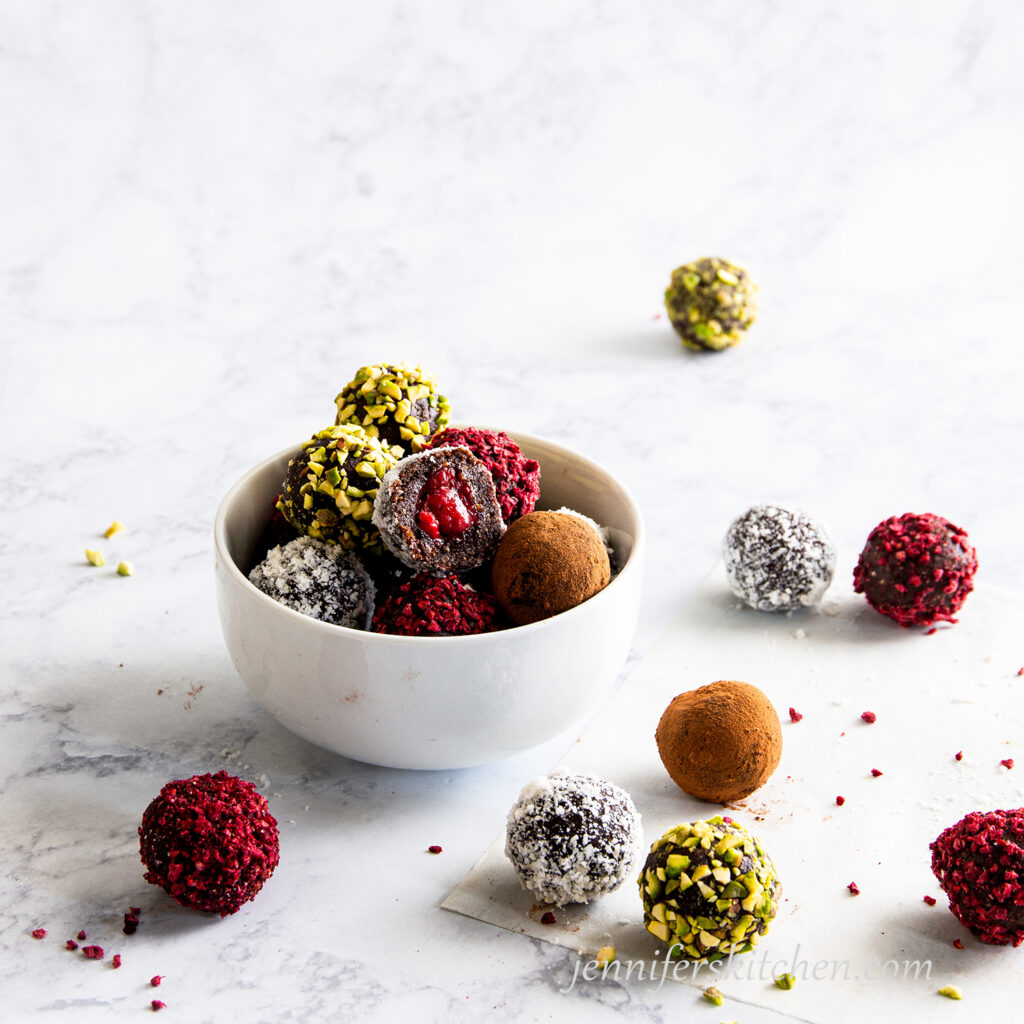
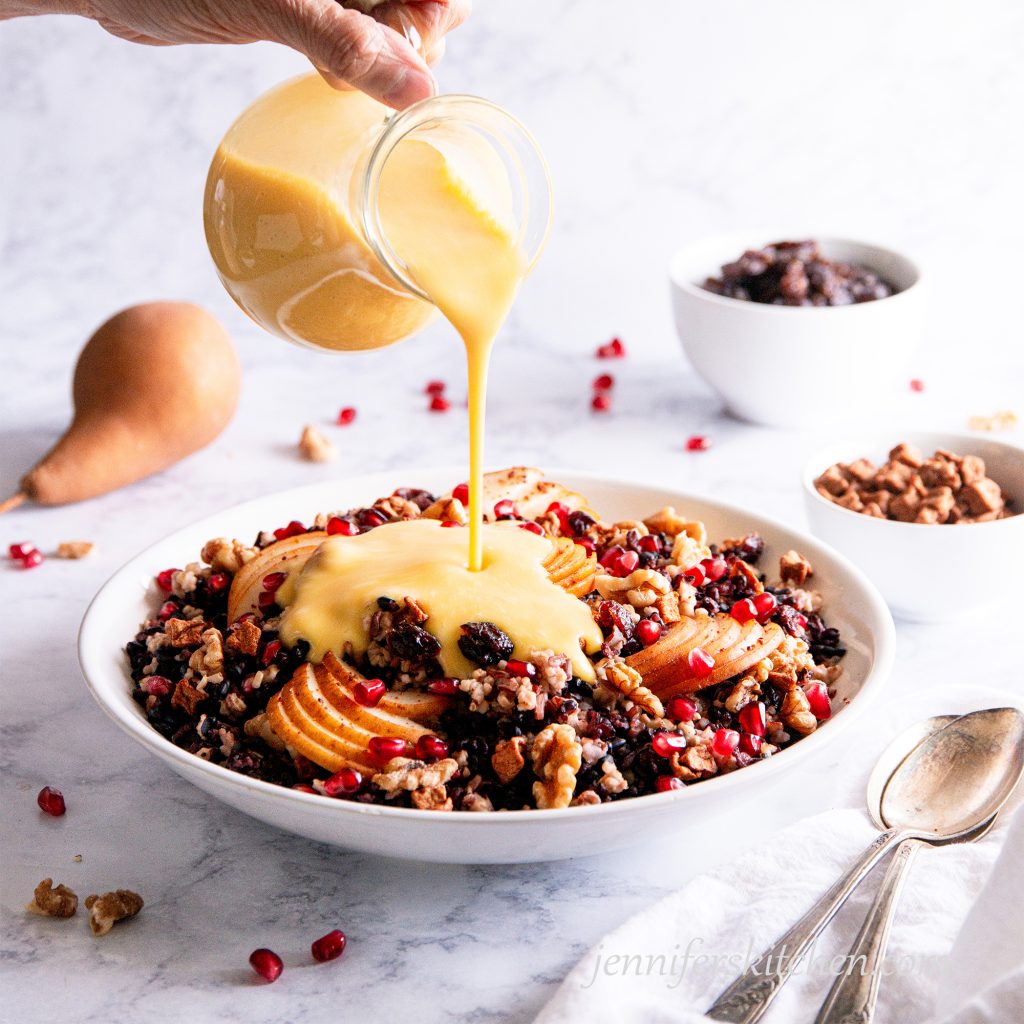
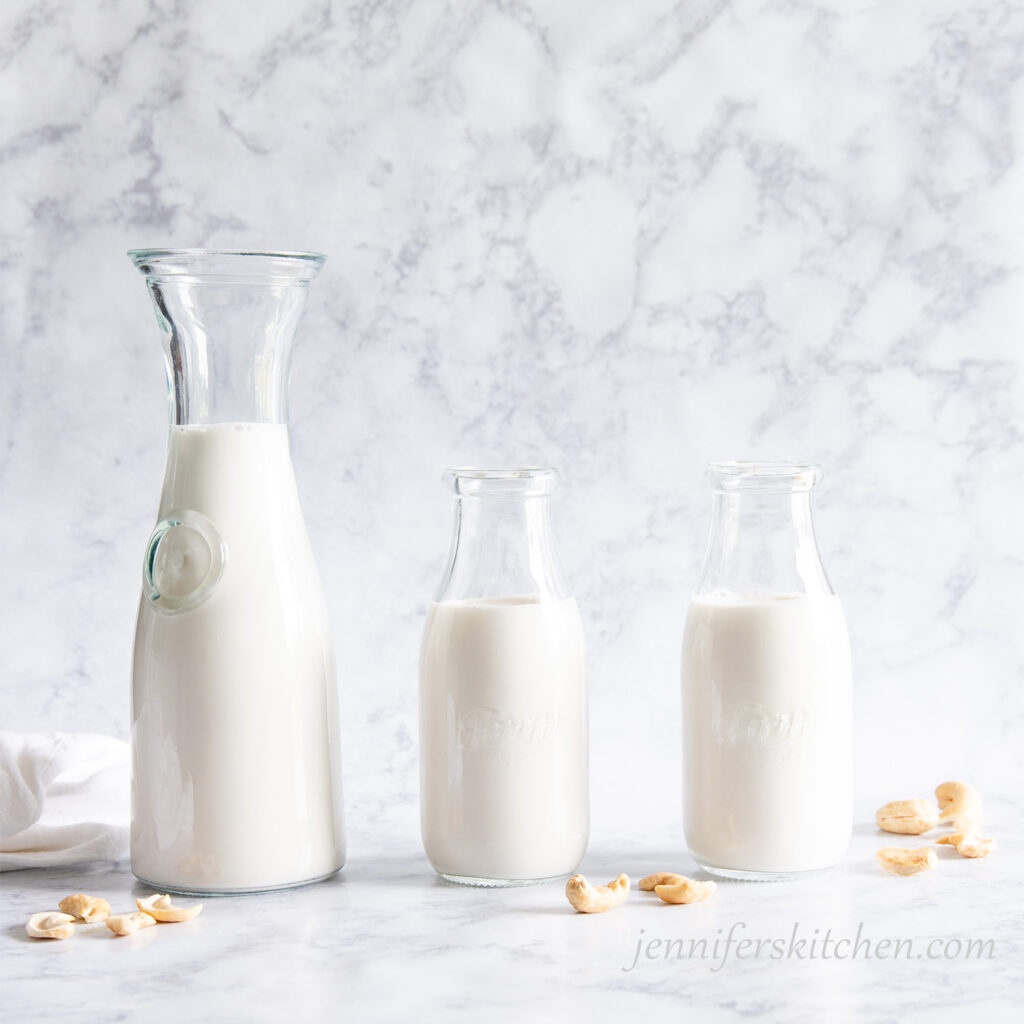
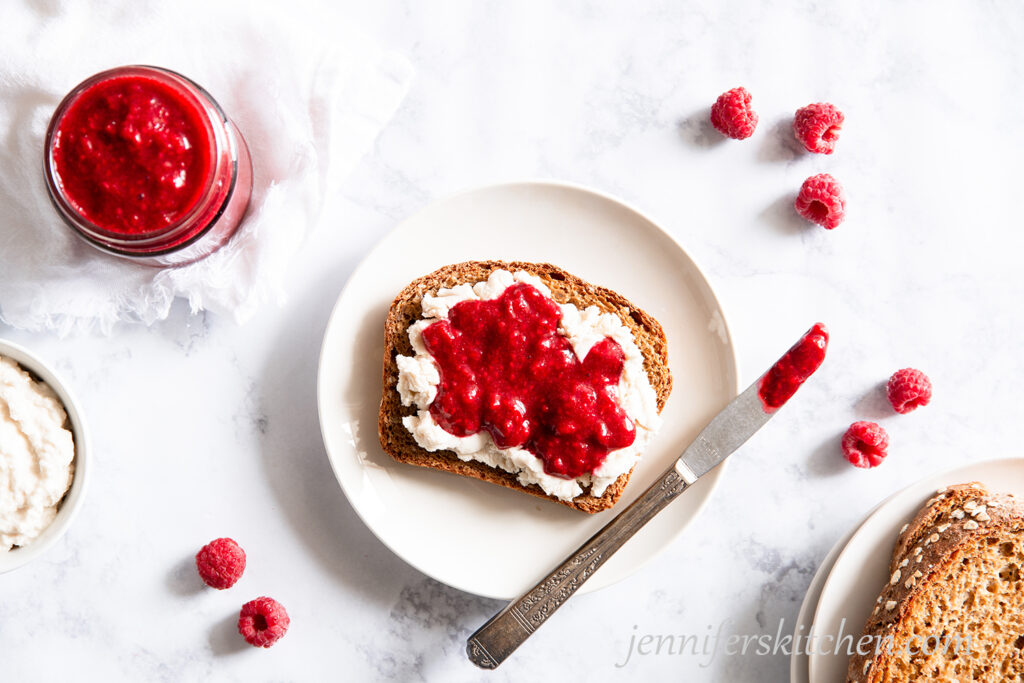
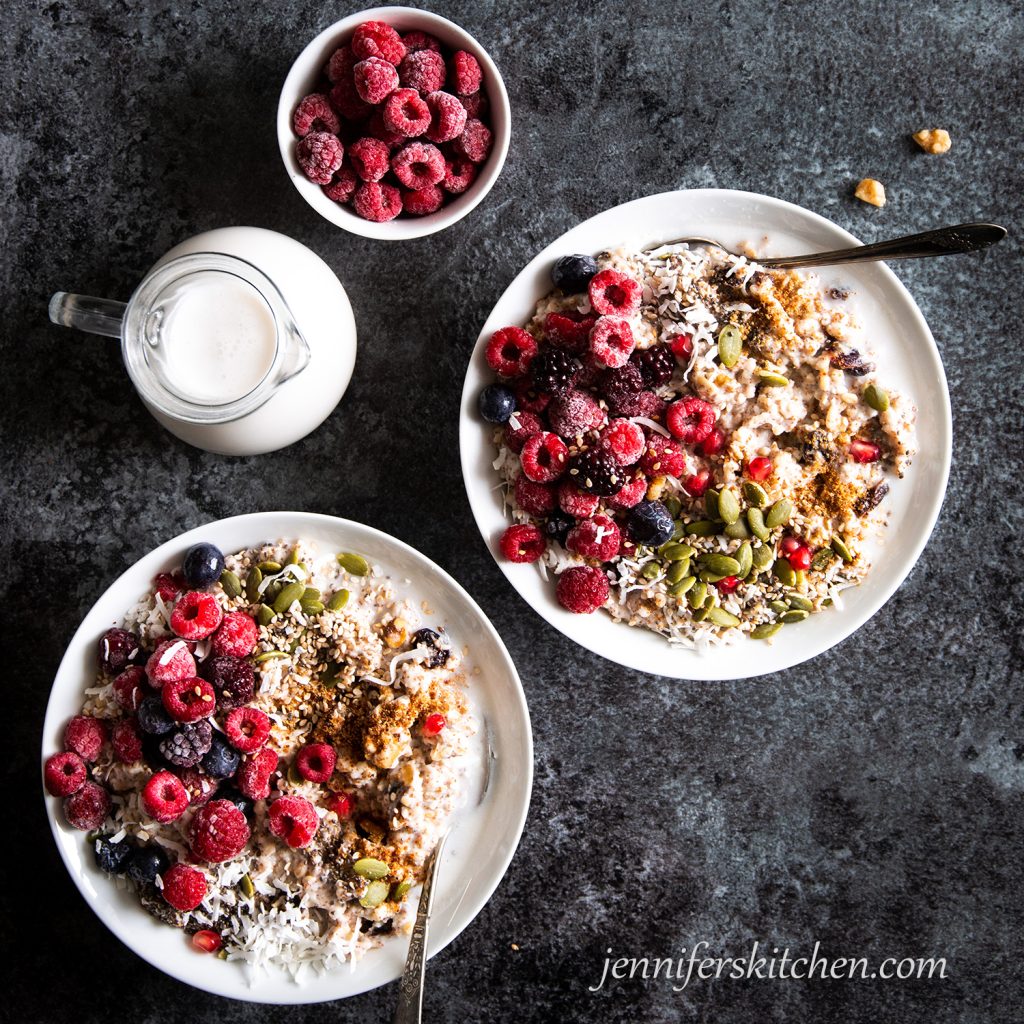
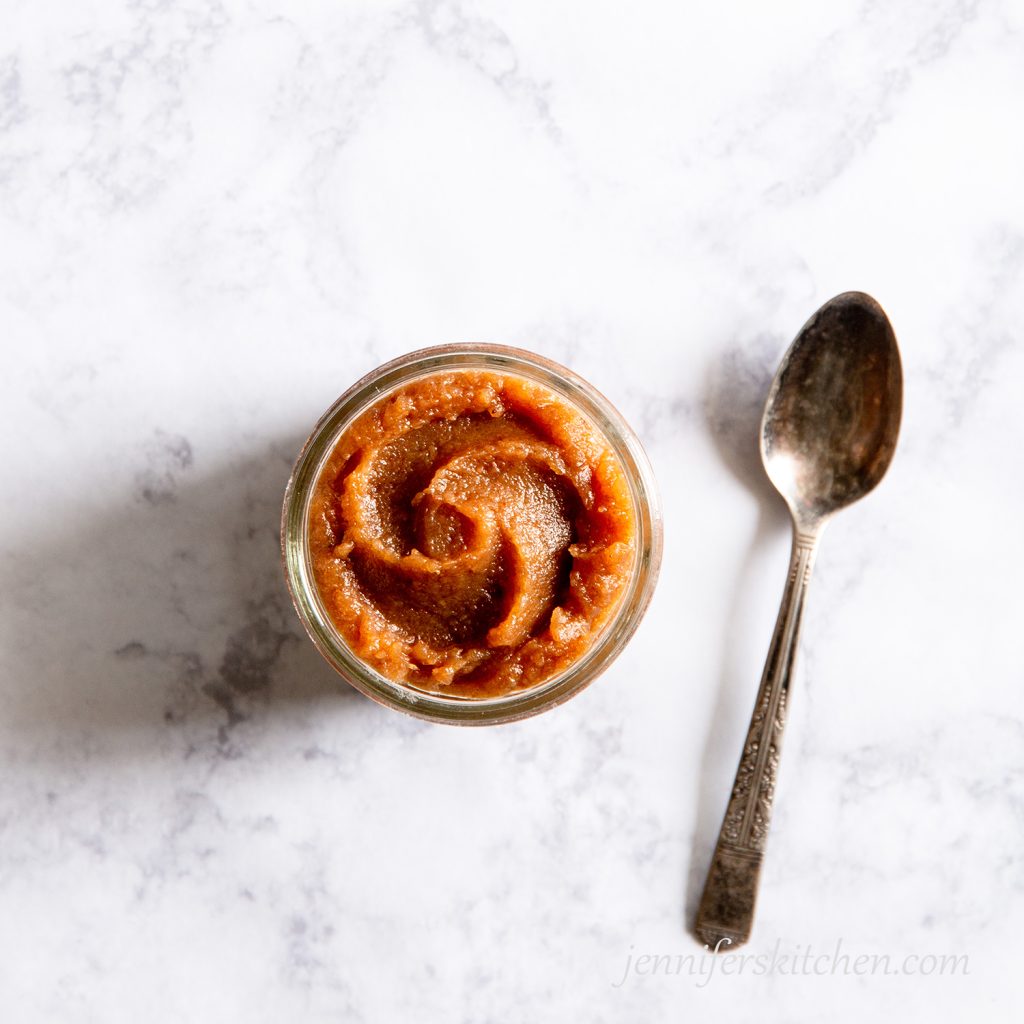
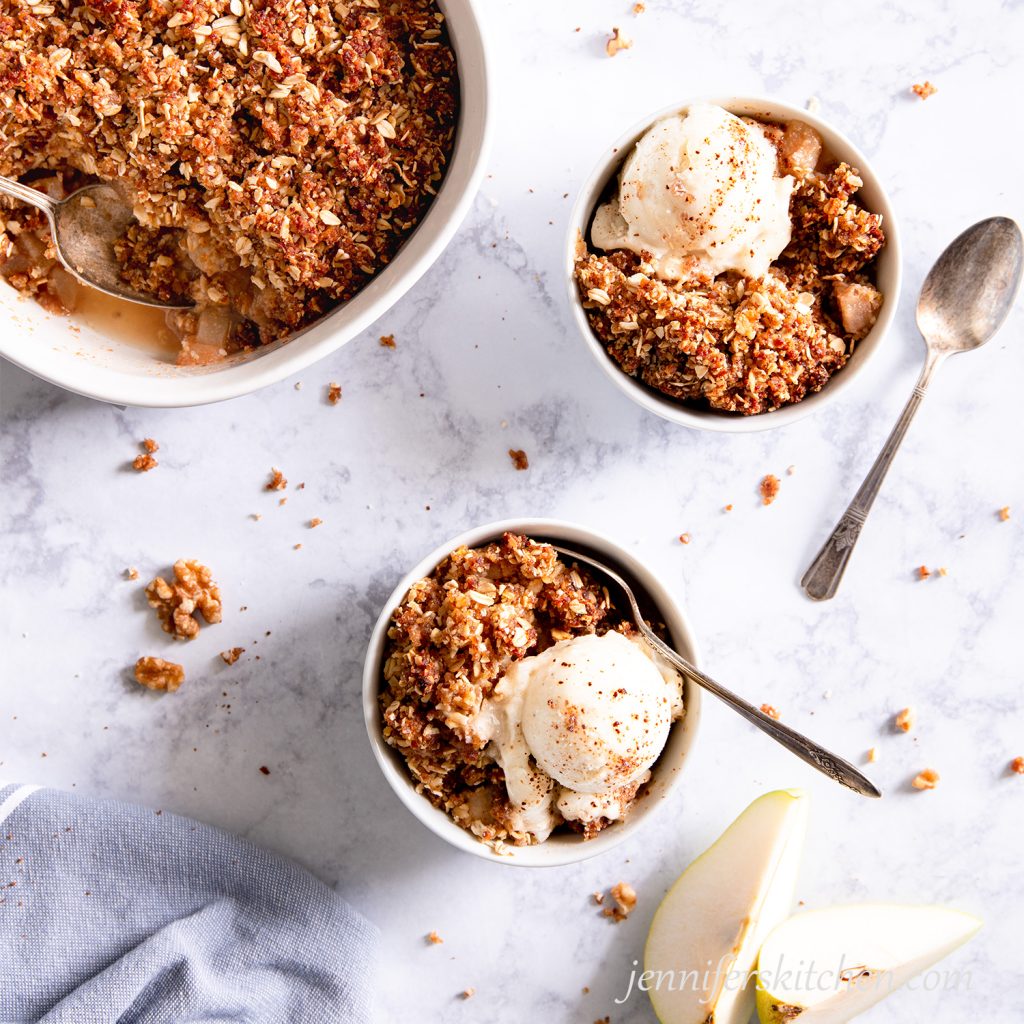

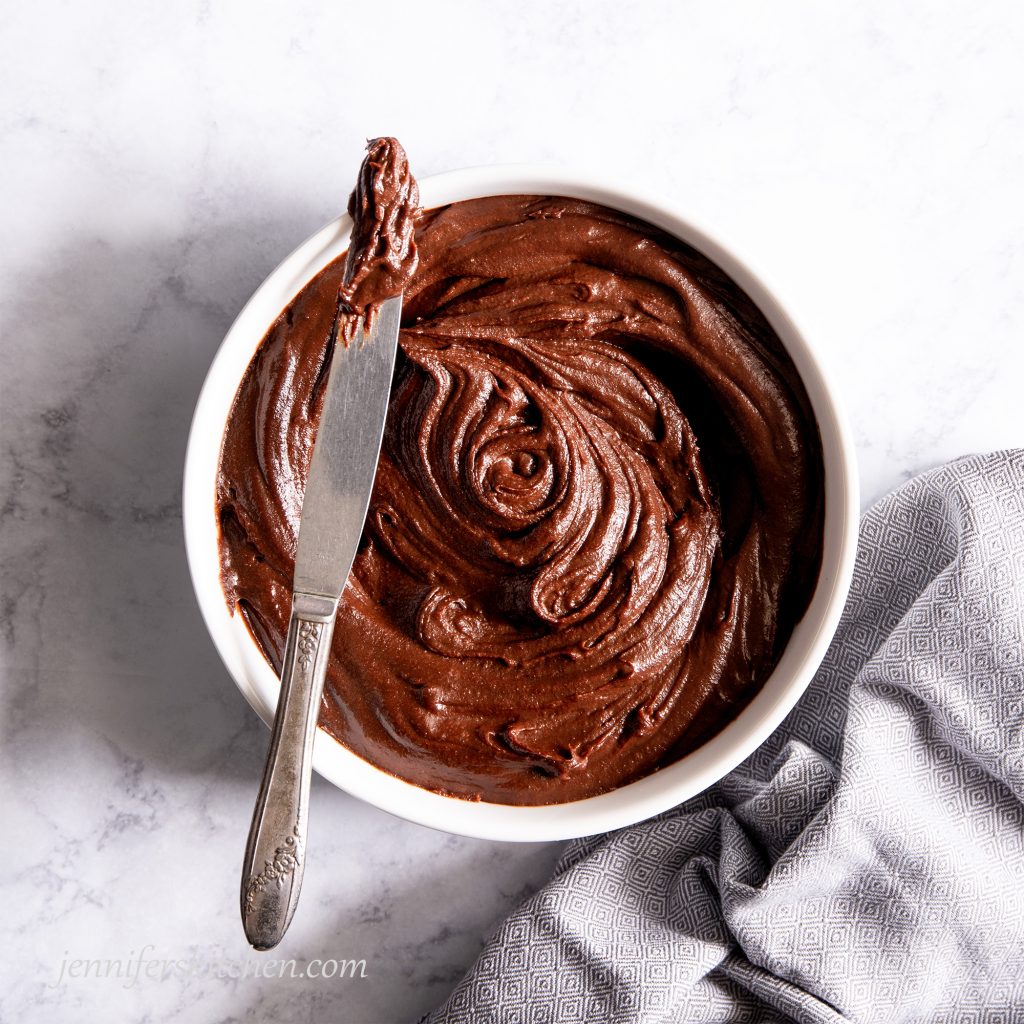
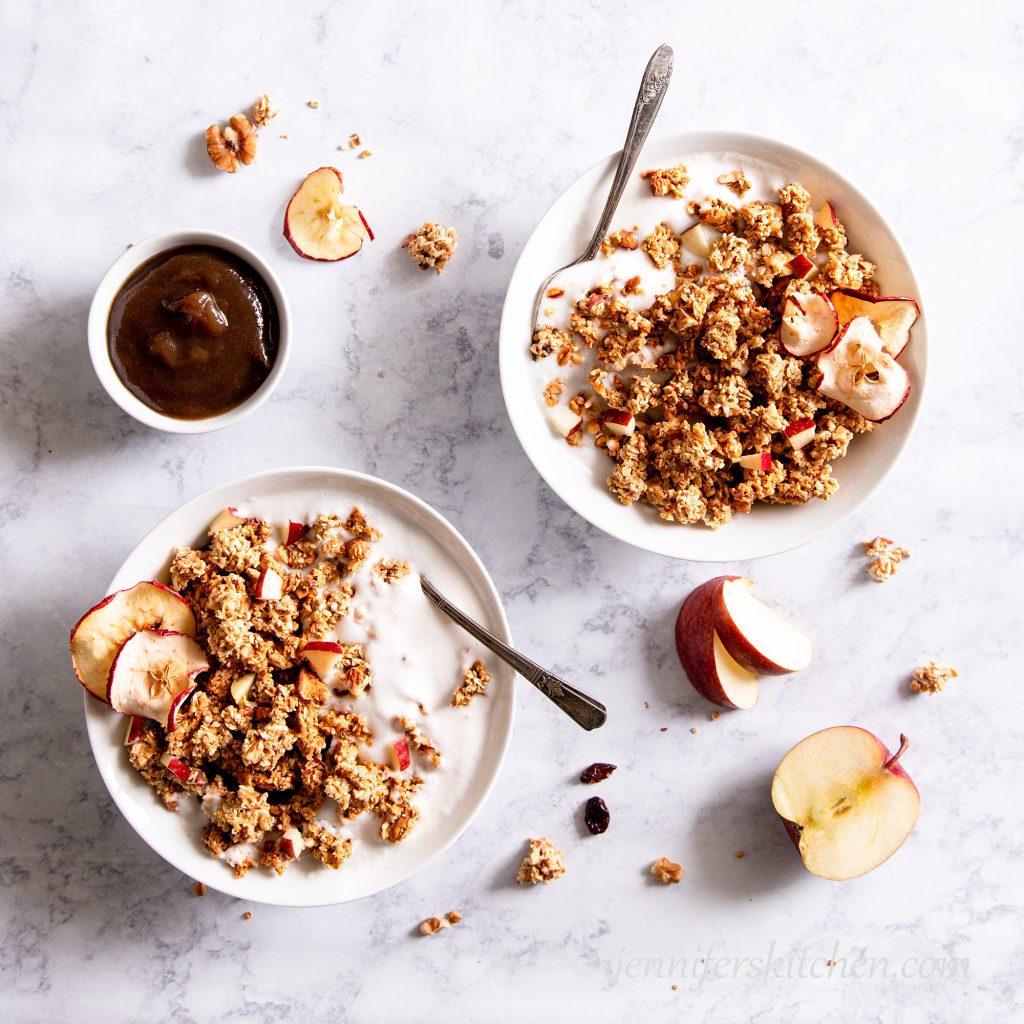
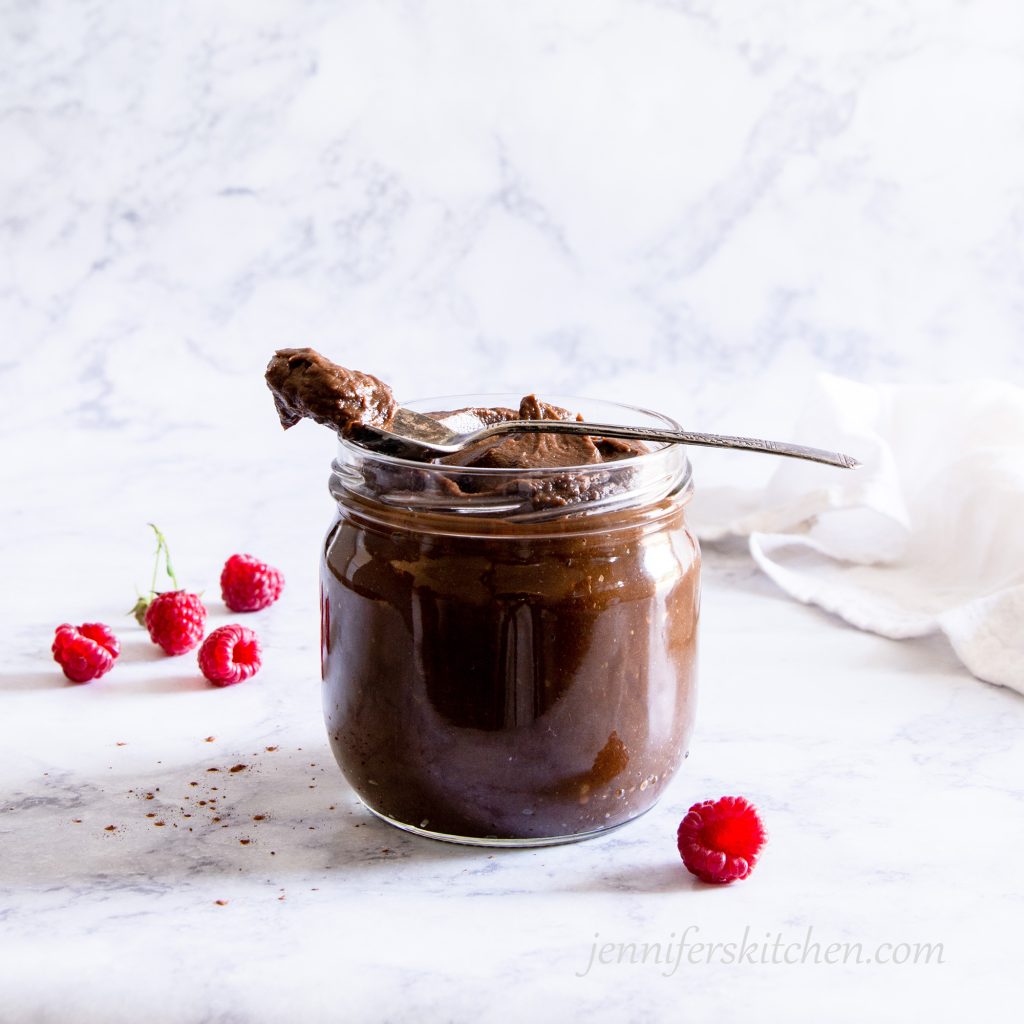
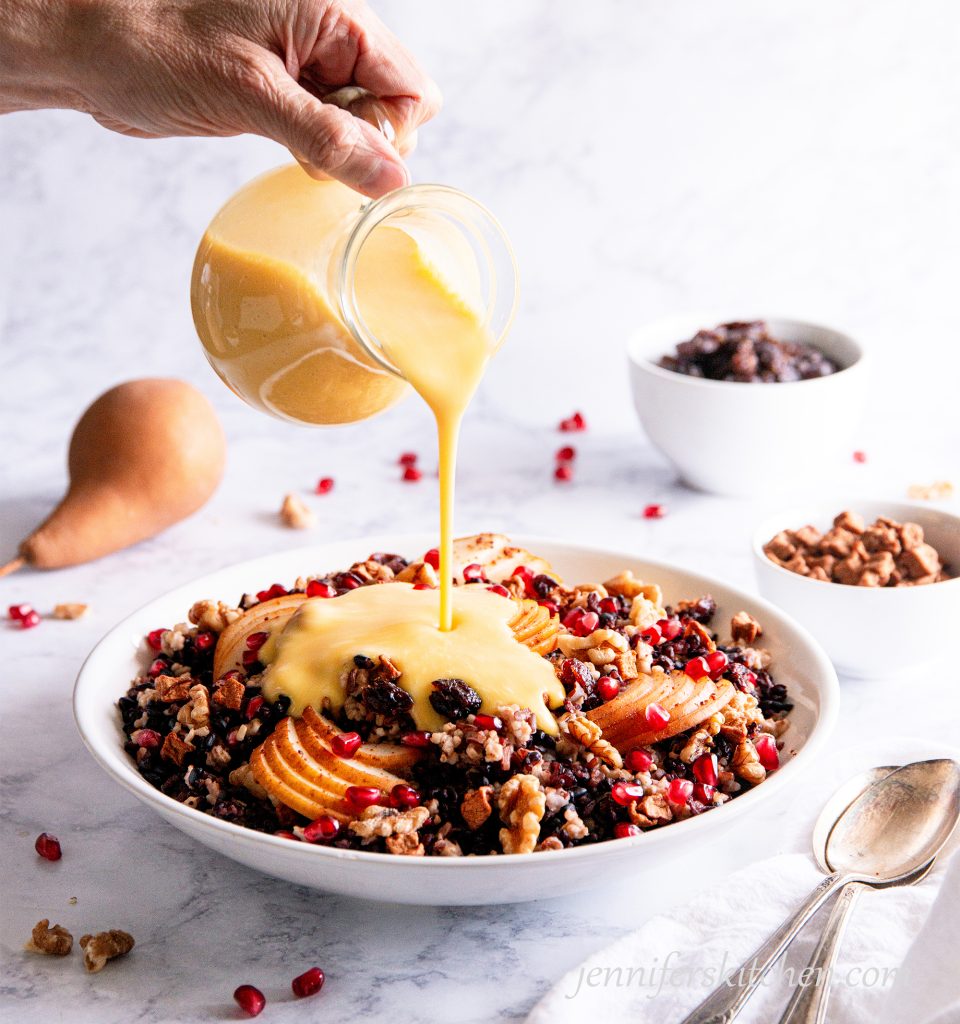
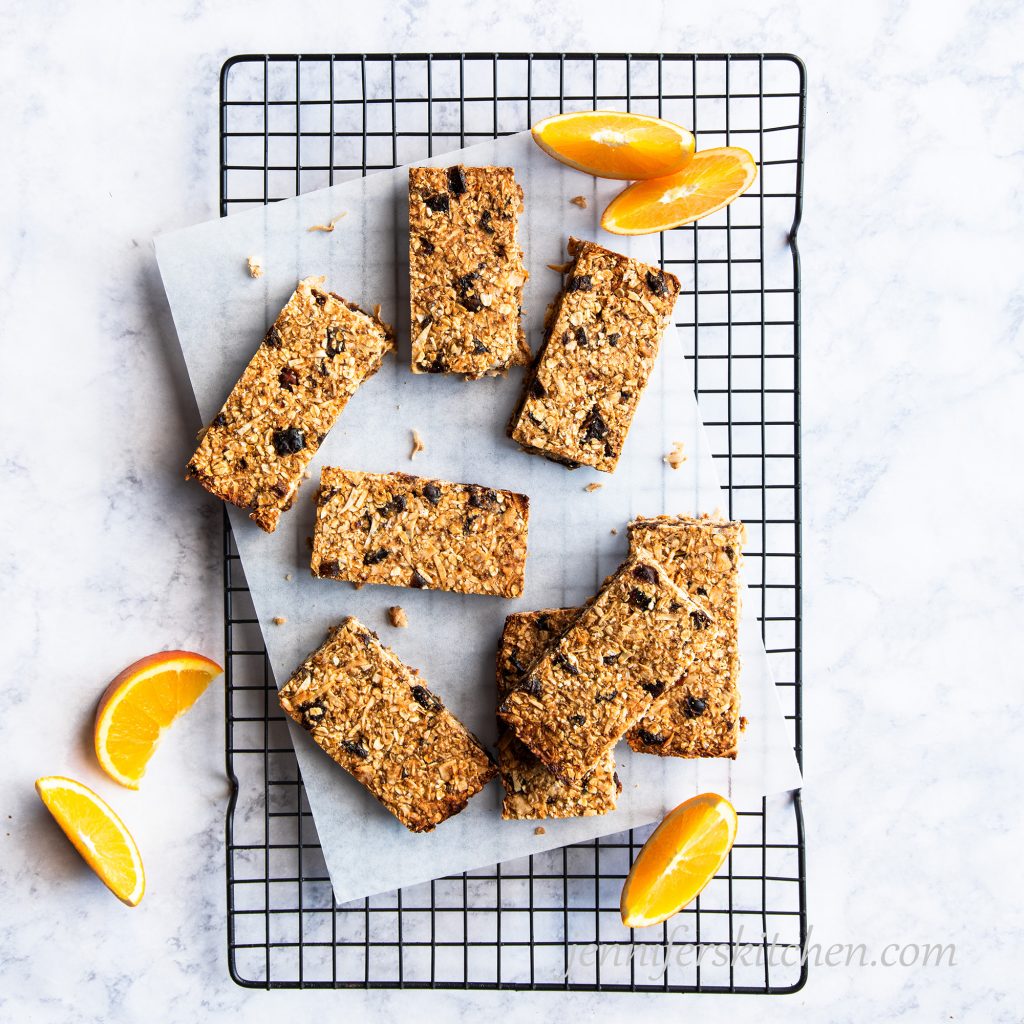
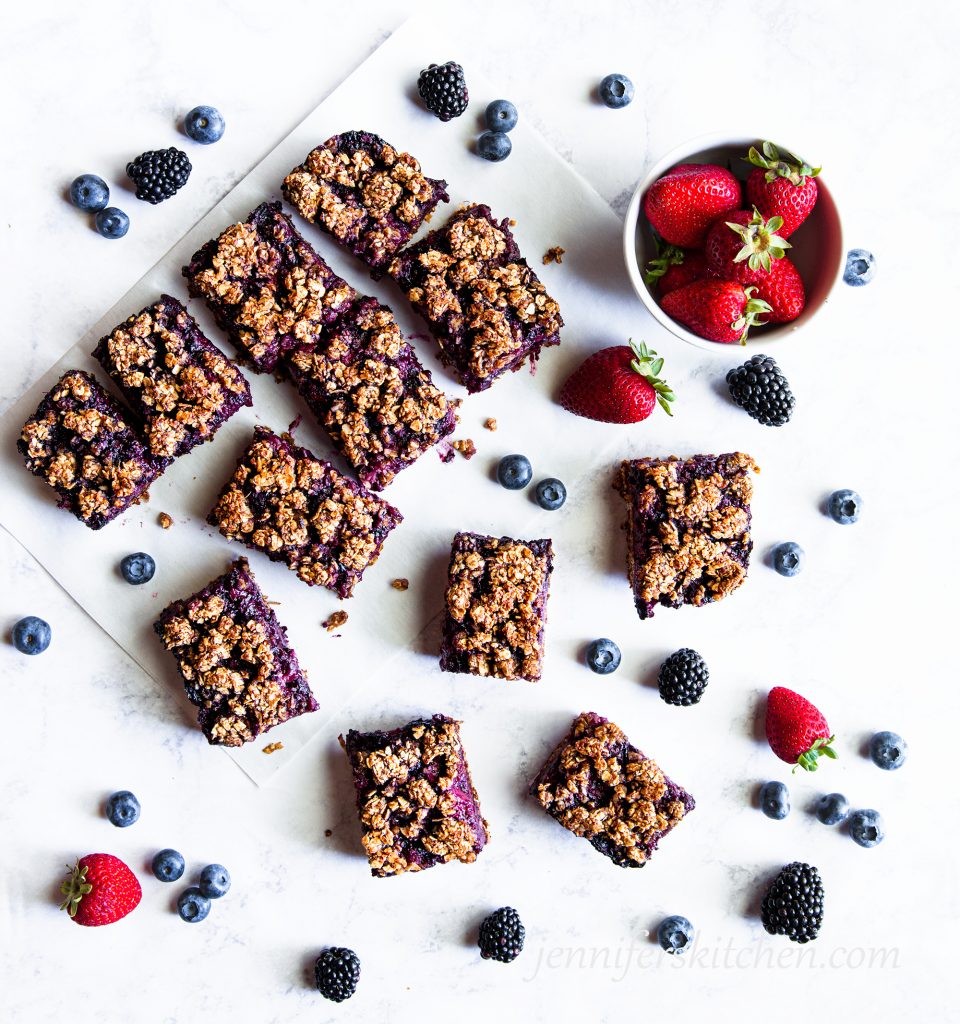
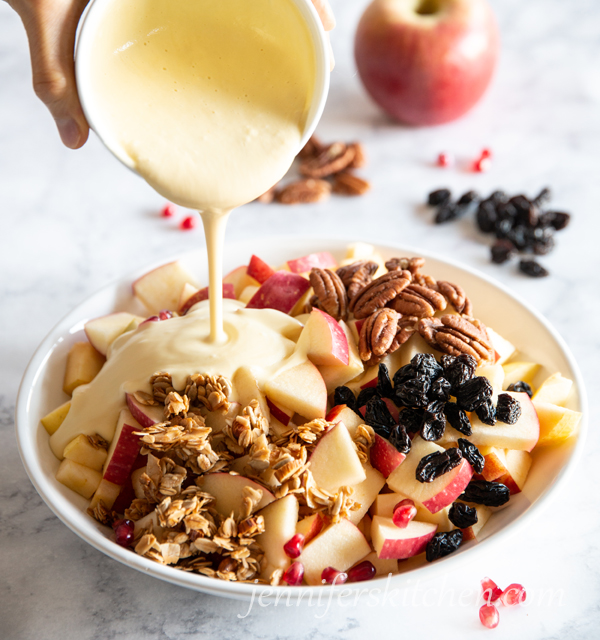
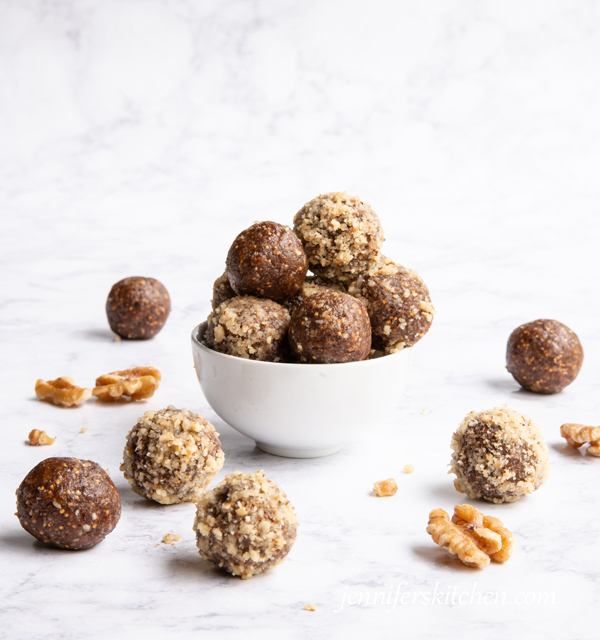
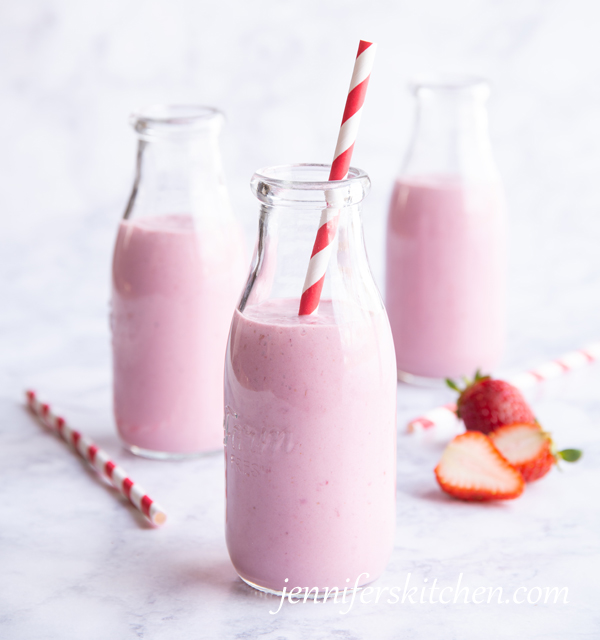
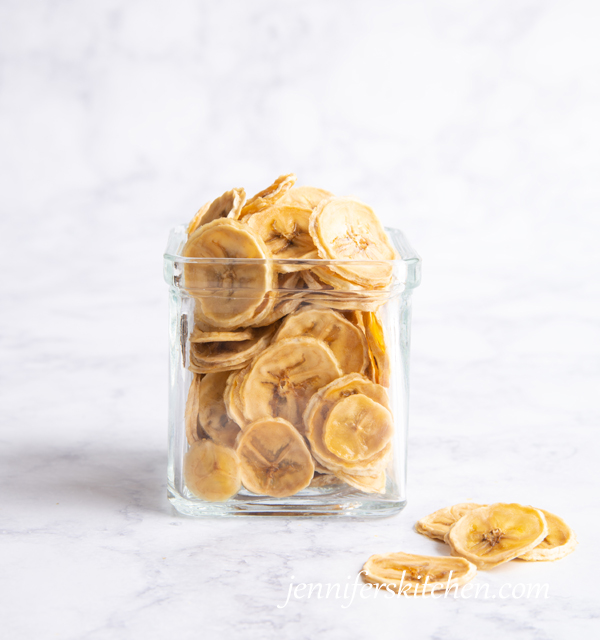
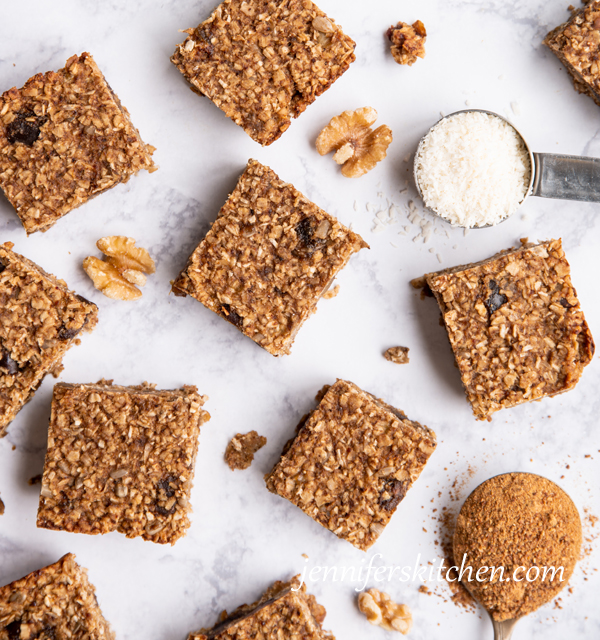
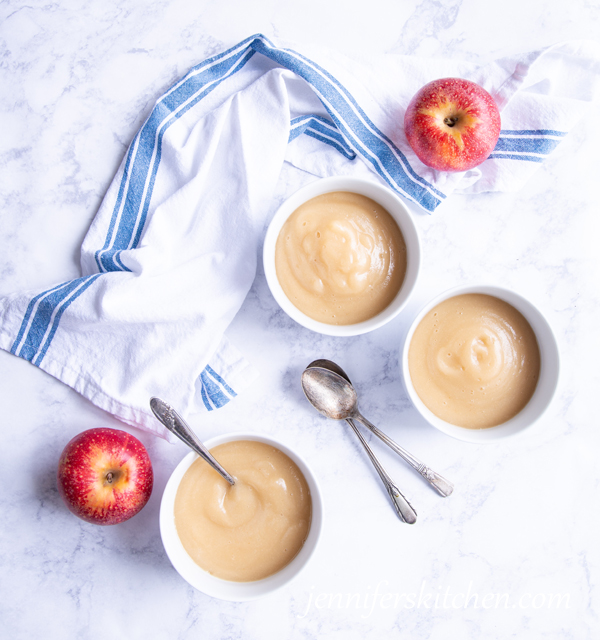
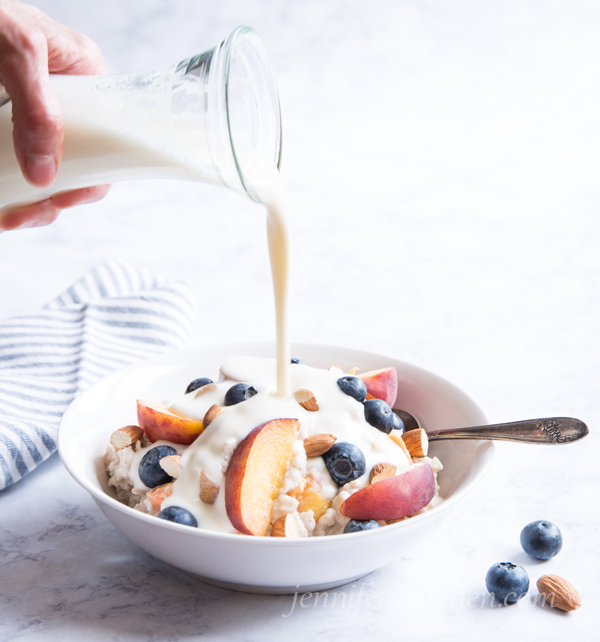




Jennifer, I have found your excellent recipes delicious, easy, and healthful! I am looking forward to continuing my weight loss program with you and thank you for such a great program! You make this fun and easy! My husband loves your recipes as well! Win/Win!
Good health is the goal!
Carol Mattson
Thank you for your kind words, Carol. I’m delighted to hear that you’re enjoying the weight loss program and both you and your husband are enjoying the recipes!
I love your goal!